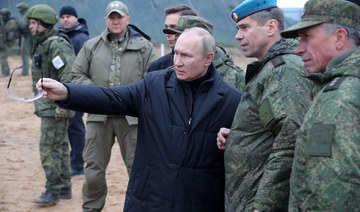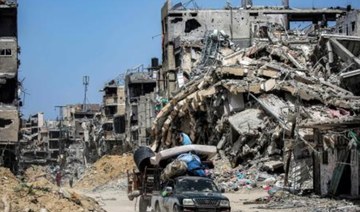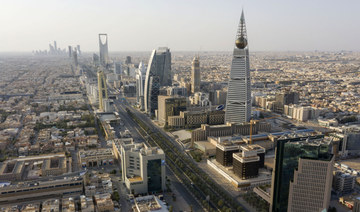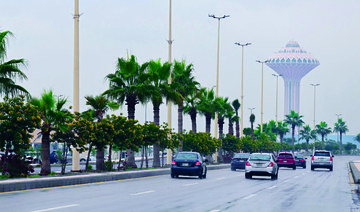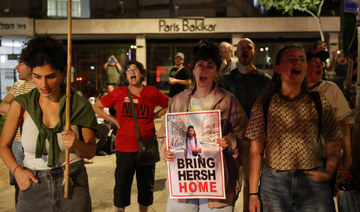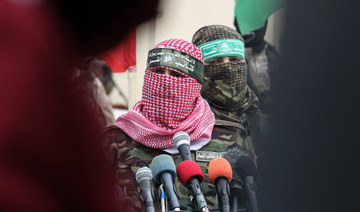The general carrying out President Vladimir Putin’s new military strategy in Ukraine has a reputation for brutality — for bombing civilians in Russia’s campaign in Syria. He also played a role in the deaths of three protesters in Moscow during the failed coup against Mikhail Gorbachev in 1991 that hastened the demise of the Soviet Union.
Bald and fierce-looking, Gen. Sergei Surovikin was put in charge of Russian forces in Ukraine on Oct. 8 after what has so far been a faltering invasion that has seen a number of chaotic retreats and other setbacks over the nearly eight months of war.
Putin put the 56-year-old career military man in command following an apparent truck bombing of the strategic bridge to the Crimean Peninsula that embarrassed the Kremlin and created logistical problems for the Russian forces.
Russia responded with a barrage of strikes across Ukraine, which Putin said were aimed at knocking down energy infrastructure and Ukrainian military command centers. Such attacks have continued on a daily basis, pummeling power plants and other facilities with cruise missiles and waves of Iranian-made drones.
Surovikin also retains his job of air force chief, a position that could help coordinate the airstrikes with other operations.
During the most recent bombardments, some Russian war bloggers carried a statement attributed to Surovikin that signaled his intention to pursue the attacks with unrelenting vigor in an attempt to pound the Kyiv government into submission.
“I don’t want to sacrifice Russian soldiers’ lives in a guerrilla war against hordes of fanatics armed by NATO,” the bloggers quoted his statement as saying. “We have enough technical means to force Ukraine to surrender.”
While the veracity of the statement couldn’t be confirmed, it appears to reflect the same heavy-handed approach that Surovikin took in Syria where he oversaw the destruction of entire cities to flush out rebel resistance without paying much attention to the civilian population. That indiscriminate bombing drew condemnation from international human rights groups, and some media reports have dubbed him “General Armageddon.”
Putin awarded Surovikin the Hero of Russia medal, the country’s highest award, in 2017 and promoted him to full general.
Kremlin hawks lauded Surovikin’s appointment in Ukraine. Yevgeny Prigozhin, a millionaire businessman dubbed “Putin’s chef” who owns a prominent military contractor that plays a key role in the fighting in Ukraine, praised him as “the best commander in the Russian army.”
But even as hard-liners expected Surovikin to ramp up strikes on Ukraine, his first public statements after his appointment sounded more like a recognition of the Russian military’s vulnerabilities than blustery threats.
In remarks on Russian state television, Surovikin acknowledged that Russian forces in southern Ukraine were in a “quite difficult position” in the face of Ukrainian counteroffensive.
In carefully scripted comments that Surovikin appeared to read from a teleprompter, he said that further action in the region will depend on the evolving combat situation. Observers interpreted his statement as an attempt to prepare the public for a possible Russian pullback from the strategic southern city of Kherson in southern Ukraine.
Surovikin began his military career with the Soviet army in 1980s and, as a young lieutenant, was named an infantry platoon commander. When he later rose to air force chief, it drew a mixed reaction in the ranks because it marked the first time when the job was given to an infantry officer.
He found himself in the center of a political storm in 1991.
When members of the Communist Party’s old guard staged a hard-line coup in August of that year, briefly ousting Gorbachev and sending troops into Moscow to impose a state of emergency, Surovikin commanded one of the mechanized infantry battalions that rolled into the capital.
Popular resistance mounted quickly, and in the final hours of the three-day coup, protesters blocked an armored convoy led by Surovikin and tried to set some of the vehicles ablaze. In a chaotic melee, two protesters were shot and a third was crushed to death by an armored vehicle.
The coup collapsed later that day, and Surovikin was quickly arrested. He spent seven months behind bars pending an inquiry but was eventually acquitted and even promoted to major as investigators concluded that he was only fulfilling his duties.
Another rocky moment in his career came in 1995, when Surovikin was convicted of illegal possession and trafficking of firearms while studying at a military academy. He was sentenced to a year in prison but the conviction was reversed quickly.
He rose steadily through the ranks, commanding units deployed to the former Soviet republic of Tajikistan, leading troops sent to Chechnya and serving at other posts across Russia.
He was appointed commander of Russian forces in Syria in 2017 and served a second stint there in 2019 as Moscow sought to prop up President Bashar Assad’s regime and help it regain ground amid a devastating civil war.
In a 2020 report, Human Rights Watch named Surovikin, along with Putin, Assad and other figures as bearing command responsibility for violations during the 2019-20 Syrian offensive in Idlib province.
He apparently has a temper that has not endeared him to subordinates, according to Russian media. One officer under Surovikin complained to prosecutors that the general had beaten him after becoming angry over how he voted in parliamentary elections; another subordinate reportedly shot himself. Investigators found no wrongdoing in either case.
His track record in Syria could have been a factor behind his appointment in Ukraine, as Putin has moved to raise the stakes and reverse a series of humiliating defeats.
Chechen leader Ramzan Kadyrov, who has repeatedly called for ramping up strikes in Ukraine, praised Surovikin as “a real general and a warrior, well-experienced, farsighted and forceful who places patriotism, honor and dignity above all.
“The united group of forces is now in safe hands,” the Kremlin-backed Kadyrov said, voicing confidence that he will “improve the situation.”
General who led Syrian bombing is new face of Russian war
https://arab.news/cm2me
General who led Syrian bombing is new face of Russian war
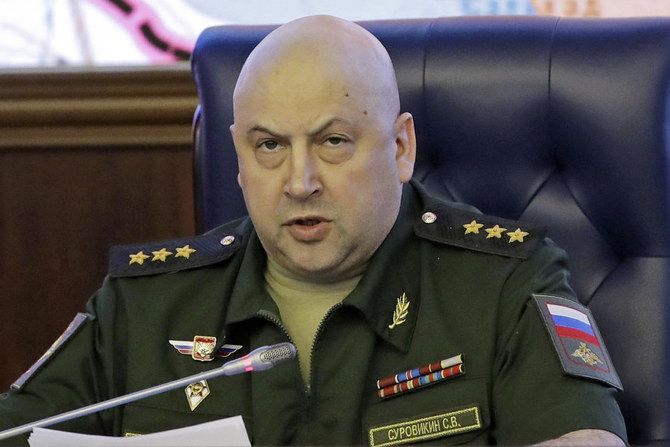
- Surovikin also retains his job of air force chief, a position that could help coordinate the airstrikes with other operations
EU commits $73 million more for Gaza aid

- New EU aid would be focused on food deliveries, clean water, sanitation and shelters
- The EU and United States have demanded that Israel allows more aid into Gaza
BRUSSELS: The European Union on Friday said it was giving an extra 68 million euros ($73 million) to provide desperately needed aid to Palestinians in Gaza.
The territory has been devastated by more than six months of Israeli bombardment and ground operations after Hamas’s October 7 attack, leaving the civilian population of two million people in need of humanitarian assistance to survive.
“In light of the continued deterioration of the severe humanitarian crisis in Gaza, and the steady rise of needs on the ground, the (European) Commission is stepping up its funding to support Palestinians affected by the ongoing war,” an EU statement said.
“This support brings total EU humanitarian assistance to 193 million euros for Palestinians in need inside Gaza and across the region in 2024.”
The EU said the new aid would be focused on food deliveries, clean water, sanitation and shelters, and would be channelled through local partners on the ground.
The United Nations has said Israel’s operation has turned Gaza into a “humanitarian hellscape,” amid fears of a looming famine.
The EU and United States have demanded that Israel allows more aid into Gaza.
The US military said on Thursday it had begun construction of a pier meant to boost deliveries to the territory.
The war in Gaza began with an unprecedented Hamas attack on Israel on October 7 that resulted in the deaths of about 1,170 people in Israel, according to an AFP tally of Israeli official figures.
Israel vowed to destroy Hamas, with a retaliatory offensive that has killed at least 34,356 people in Gaza, mostly women and children, according to the Hamas-run territory’s health ministry.
Egypt sending ceasefire delegation to Israel
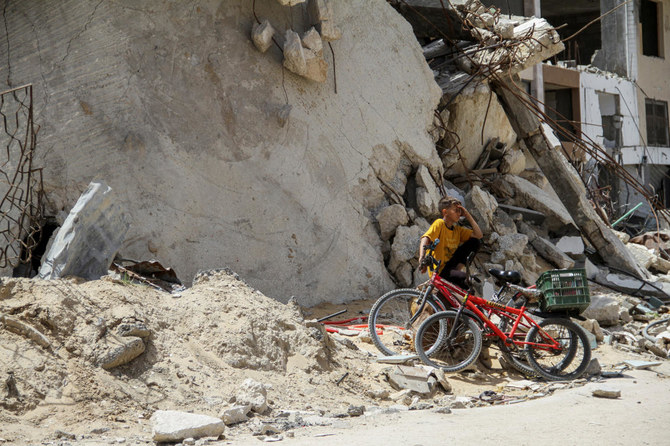
- Egyptian intelligence chief Abbas Kamel plans to make clear that Egypt ‘will not tolerate’ Israel’s deployments of troops along Gaza’s borders with Egypt
Egypt is sending a high-level delegation to Israel in the hope of reaching a ceasefire agreement with Hamas in Gaza, while warning a possible new Israeli offensive focused on the southern city of Rafah on the border with Egypt could have catastrophic consequences for regional stability, two officials said Friday.
While in Israel, Egyptian intelligence chief Abbas Kamel plans to make clear that Egypt “will not tolerate” Israel’s deployments of troops along Gaza’s borders with Egypt, an Egyptian official said, speaking on condition of anonymity to freely discuss the mission.
Earlier Friday, Lebanon’s militant Hezbollah group fired anti-tank missiles and artillery shells at an Israeli military convoy in a disputed area along the border, killing an Israeli civilian, the group and Israel’s military.
Hezbollah said that its fighters ambushed the convoy shortly before midnight Thursday, destroying two vehicles. The Israeli military said the ambush wounded an Israeli civilian doing infrastructure work, and that he later died of his wounds.
Low-intensity fighting along the Israel-Lebanon border has repeatedly threatened to boil over as Israel has targeted senior Hezbollah militants in recent months.
Tens of thousands of people have been displaced on both sides of the border. On the Israeli side, the cross-border fighting has killed 10 civilians and 12 soldiers, while in Lebanon, more than 350 people have been killed, including 50 civilians and 271 Hezbollah members.
On Thursday, Palestinian hospital officials said Israeli airstrikes on the southern city of Rafah in the Gaza Strip killed at least five people.
More than half of the territory’s population of 2.3 million have sought refuge in Rafah, where Israel has conducted near-daily raids as it prepares for an offensive in the city. The Israeli military has massed dozens of tanks and armored vehicles in the area in what appears to be preparations for an invasion of Rafah.
In central Gaza, four people were killed in Israeli tank shelling.
A ship traveling in the Gulf of Aden came under attack Thursday, officials said, the latest assault likely carried out by Yemen’s Houthi rebels over the Israel-Hamas war.
Meanwhile, a top Hamas political official said that the Islamic militant group is willing to agree to a truce of five years or more with Israel.
The Israel-Hamas war was sparked by the unprecedented Oct. 7 raid into southern Israel in which militants killed around 1,200 people, mostly civilians, and abducted around 250 hostages. Israel says the militants are still holding around 100 hostages and the remains of more than 30 others.
The war has killed more than 34,000 Palestinians, according to local health officials, around two-thirds of them children and women.
Sheikh Mansour bin Zayed receives Saudi envoy in Abu Dhabi
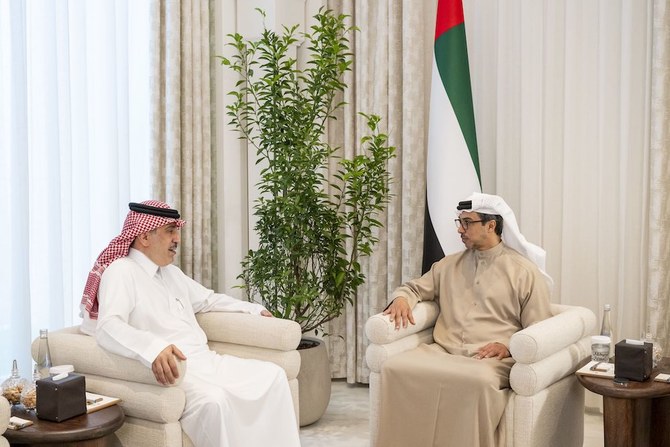
DUBAI: Sheikh Mansour bin Zayed Al-Nahyan, Vice President, Deputy Prime Minister and Chairman of the Presidential Court, has received Sultan bin Abdullah Al-Anqari, Saudi Arabia’s ambassador to the UAE.
During a meeting at Qasr Al-Shati in Abu Dhabi, the two officials discussed relations between the two countries and ways to enhance cooperation that would be beneficial to both nations, state news agency WAM said.
Sheikh Mansour emphasized the robust ties between the UAE and Saudi Arabia are underpinned by the leadership of both countries.
US military starts pier construction off Gaza

- But humanitarian aid coming off the pier will need to pass through Israeli checkpoints on land
- Despite the aid having already been inspected by Israel in Cyprus prior to being shipped to Gaza
WASHINGTON: US troops have begun construction of a maritime pier off the coast of Gaza that aims to speed the flow of humanitarian aid into the enclave when it becomes operational in May, the Pentagon said on Thursday.
President Joe Biden announced the pier in March as aid officials implored Israel to ease access for relief supplies into Gaza over land routes. Whether the pier will ultimately succeed in boosting humanitarian aid is unclear, as international officials warn of the risk of famine in northern Gaza.
Israel’s six-month-long military campaign against Hamas has devastated the tiny Gaza Strip and plunged its 2.3 million people into a humanitarian catastrophe.
A senior Biden administration official, speaking to reporters on condition of anonymity, said humanitarian aid coming off the pier will need to pass through Israeli checkpoints on land. That is despite the aid having already been inspected by Israel in Cyprus prior to being shipped to Gaza. Israel wants to prevent any aid getting to Hamas fighters that boosts their war effort.

The prospect of checkpoints raises questions about possible delays even after aid reaches shore. The United Nations has long complained of obstacles to getting aid in and distributing it throughout Gaza.
“I can confirm that US military vessels, to include the USNS Benavidez, have begun to construct the initial stages of the temporary pier and causeway at sea,” Pentagon spokesperson Major General Patrick Ryder told reporters.
Concerns about the risk to American troops getting caught up in the Israel-Hamas war were underscored on Thursday as news emerged of a mortar attack near the area where the pier will eventually touch ground. No US forces were present, however, and Biden has ordered US forces to not step foot on the Gaza shore.
The pier will initially handle 90 trucks a day, but that number could go up to 150 trucks daily when it is fully operational. The United Nations said this week that the daily average number of trucks entering Gaza during April was 200 and that there had been a peak on Monday of 316.
The official added that about 1,000 US troops would support the military effort, including in coordination cells in Cyprus and Israel.
A third party will be driving trucks down the pier onto the beach, the official added.
The northern Gaza Strip is still heading toward a famine, the deputy UN food chief said on Thursday, appealing for a greater volume of aid and for Israel to allow direct access from its southern Ashdod port to the Erez crossing.
In a statement, the Israeli military said it would provide security and logistics support for the pier.
An Israeli military brigade, which includes thousands of soldiers, along with Israeli Navy ships and Air Force would work to protect US troops who are setting up the pier.
Ryder said the Pentagon was tracking some type of mortar attack in Gaza that caused minimal damage in the marshalling area for the pier. But he added that US forces had not started moving anything to that area yet and there were no US forces on the ground.
Hamas official says Israel ‘will not achieve’ goals in Rafah
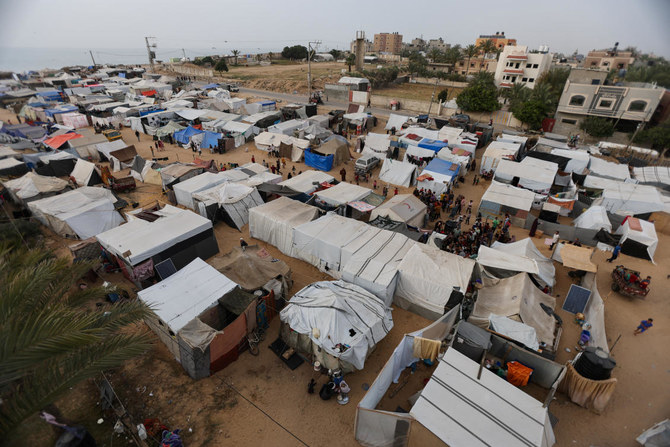
- “Even if (Israel) enters and invades Rafah, it will not achieve what it wants,” Ghazi Hamad said
- “This will undoubtedly threaten the negotiations because it is clear from this declared position that Israel is interested in continuing the war“
GAZA STRIP, Palestinian Territories: A senior Hamas official told AFP on Thursday that Israel would fail to meet its stated goals of defeating the Palestinian militant group and freeing hostages by invading the southern Gaza city Rafah.
“Even if (Israel) enters and invades Rafah, it will not achieve what it wants,” Ghazi Hamad said in an interview over the phone from Qatar, where a number of senior figures from Hamas’s political bureau are based.
Hamad said Israel had “spent nearly seven months in Gaza and invaded all areas and destroyed a lot, but so far has not been able to achieve anything of its main goals, whether eliminating Hamas or returning the captives.”
Israel has vowed to move on with the planned military operation in Rafah, despite international outcry and concern for about 1.5 million Palestinians sheltering in the city.
There are fears of huge civilian casualties and countries including Israel’s top ally and weapons supplier the United States have warned Israel against sending troops into Rafah.
“We have spoken with all parties involved in the conflict... about the seriousness of invading Rafah and that Israel is heading toward committing additional massacres and additional genocide,” Hamad said.
“This will undoubtedly threaten the negotiations because it is clear from this declared position that Israel is interested in continuing the war and aggression and has no intention of continuing negotiations and reaching an agreement,” he said.
Qatar, the United States and Egypt, have been mediating talks to secure a truce and the release of hostages, but those have stalled for days.
An Egyptian delegation is however set to travel to Israel on Friday to kickstart a new round of talks, Israeli media reported citing unnamed officials.
Israeli government spokesman David Mencer said Israel’s war cabinet was meeting Thursday “to discuss how to destroy the last battalions of Hamas.”
On Wednesday, Mencer said that since Israel began its ground invasion of Gaza on October 27, the army has destroyed “at least 18 or 19 of Hamas’s 24 battalions.”
Officials say the remaining battalions are in Rafah — the main target of the impending assault.
Most Gazans taking refuge in Rafah are sheltering in makeshift camps, and even before the start of the expected ground invasion, the city near the Egyptian border has been suffering regular Israeli bombings.
Hamad argued the planned invasion was exposing contradictions in Israeli Prime Minister Benjamin Netanyahu’s stance on Gaza.
“Netanyahu is stumbling because, on the one hand, he wants to return the captives to their families, as he says, but at the same time, he puts them in great danger, as his army deliberately killed many hostages.”
Israel’s army has admitted to mistakenly killing some hostages in Gaza.
Hamad accused Netanyahu of “manipulating and procrastinating” in a bid to “deceive the Israeli public that there are negotiations and deceive the international community as well that there are negotiations.”
He said the Israeli prime minister was “trying to twist the truth” and claim that “Hamas is the obstacle in these negotiations.”
Hamad said Qatar and Egypt were “making great efforts to reach an agreement,” but argued “the Israeli side unfortunately deals with the matter foolishly and is very confused.”
Hamad also told AFP that Hamas, which took power in Gaza in 2007, was already working on plans for the territory after the war.
He said the group was “working on the post-war phase to ensure that there is a great effort to rebuild the Gaza Strip and provide the necessities for a decent life.”
Palestinian militants took around 250 hostages to Gaza during Hamas’s October 7 attack that triggered the war.
Israeli officials say 129 hostages are still held in Gaza, including 34 the military says are dead.
The attack on southern Israel resulted in the deaths of 1,170 people, Israelis and foreigners, according to an AFP tally based on official Israeli figures.
Israel’s retaliatory offensive against Hamas in Gaza has killed 34,305 people, most of them women and children, according to the territory’s health ministry.



